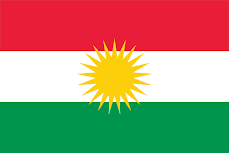Christianity began to become a main religion in the central part of Kurdish regions from the fifth century onwards. The royal house of Adiabene in central Kurdistan converted to Christianity around this period. Mar Saba succeeded in converting some sun-worshipping Kurds to Christianity in the fifth century.
Many Kurdish Christians converted to Islam after the Arab conquest of Sassanid empire. However there were Kurdish converts to Christianity even after the spread of Islam. In the ninth century, a Kurd named Nasr or Narseh converted to Christianity, and changed his name to Theophobos during the reign of Emperor Theophilus and was emperor's intimate friend and commander for many years.
There were many Kurdish Christian communities and tribes reported by medieval writers as late as 10th and 13th centuries AD. The German physician and traveller Leonhard Rauwolff visited Kurdistan in 1570s and encountered a sizable number of Nestorian Christian Kurds. They have used Aramaic (the language of Jesus) for their religious affairs, and in some cases the Armenian language. The first Bible translation of modern times was conducted in the 18th century in the Armenian alphabet. Kurdish Christians should not be confused with Semitic-speaking Christians such as the Assyrians or Armenian Christians in Kurdish regions.
In the 19th century, several Christian villages existed in Kurdistan, whose inhabitants spoke only Kurdish, and there were Muslim Kurdish tribes that recalled they were once Christians. Kurds who converted to Christianity usually turned to the Nestorian Church. In 1884, researchers of the Royal Geographical Society reported about a Kurdish tribe in Sivas which retained certain Christian observances and sometimes identified as Christian. It is also possible that many Kurdish Christians have been linguistically and hence ethnically absorbed by Semitic-speaking Christians of Mesopotamia, especially after Islamic expansions in Middle East.
In the early 20th century, a Lutheran mission from United States and Germany began to serve the Kurds of Iran. From 1911 to 1916, it established a Kurdish congregation and an orphanage.





No comments:
Post a Comment